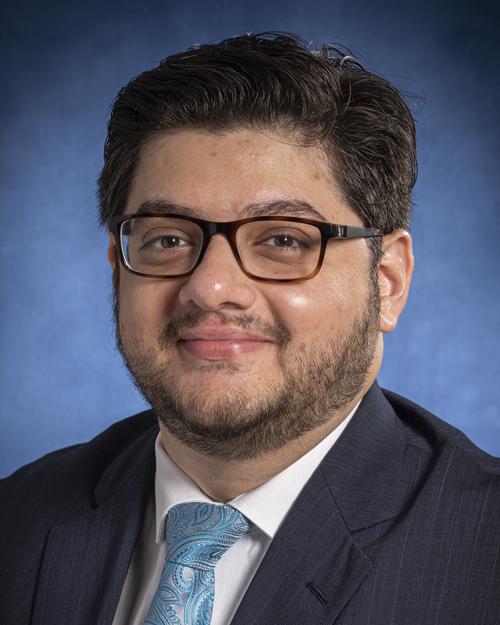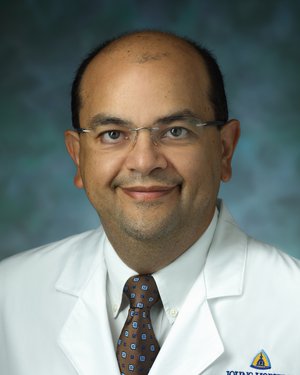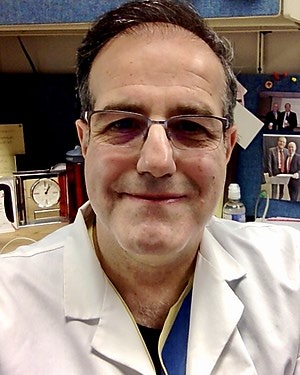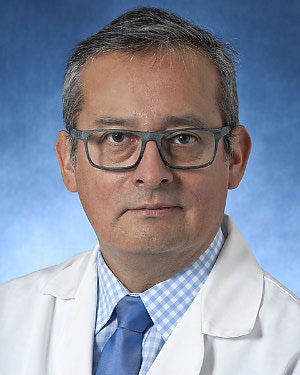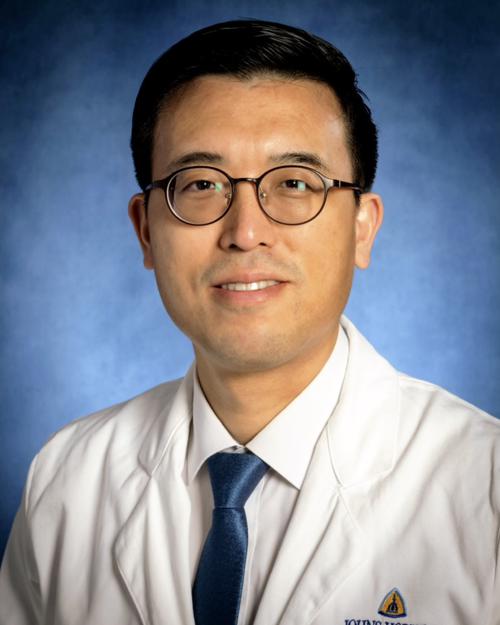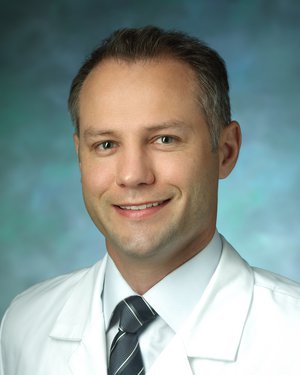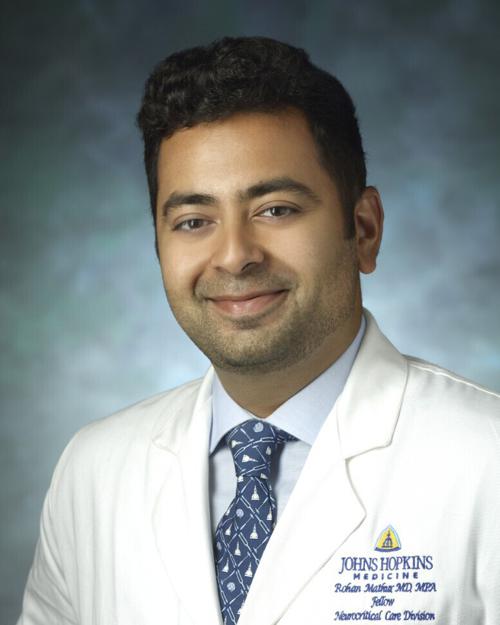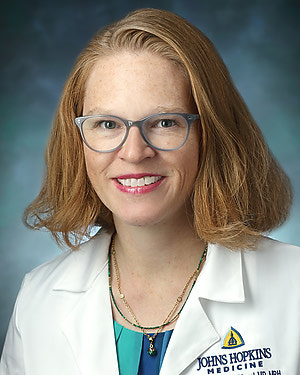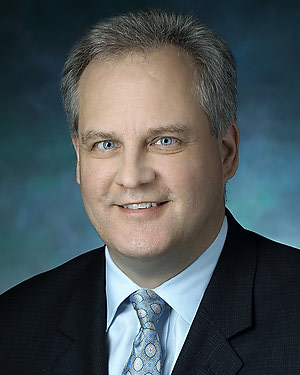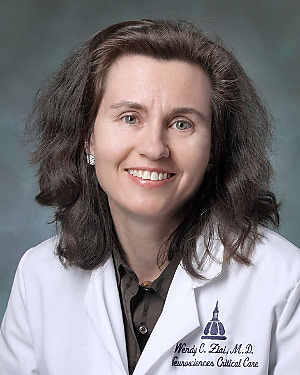The Johns Hopkins Fellowship in Neurocritical Care
The Neurocritical Care Fellowship Program at Johns Hopkins pioneered the training of fellows in the 1980s and continues to be the leading program in this sub-specialty, aiming to develop Neurocritical Care Clinician Scientists. We have trained more than 50 physicians from a variety of fields who went on to work at leading institutions as directors of neurocritical care programs, chairs of departments, established research investigators, institute directors, and hold key positions in professional societies related to neurocritical care.
On this page:
Director | Clinical Training | Electives | Education Program | Research | Faculty | Current Fellows | Alumni | Letter from the Director
Fellowship at a Glance
- Accreditation: the program is ACGME-accredited since July 2022 and maintains UCNS accreditation
- Duration: two years (52 weeks of clinical work, and the rest academic work)
- Eligibility: current residents and board-eligible recent graduates from an Accreditation Council for Graduate Medical Education (ACGME)-accredited residency program in neurology, neurosurgery, internal medicine, surgery, emergency medicine or anesthesiology/critical care medicine.
- How to apply: applications are received and screened via SF Match.
Fellowship Director
Program Features
The strength of this program is in collaboration between faculty from departments of neurosurgery, neurology and anesthesiology and critical care medicine.
Upon successful program completion, fellows are certified in advanced cardiac life support and advanced trauma life support. They are board-eligible for the United Council of Neurologic Subspecialties Neurocritical Care examination, and have accumulated a research and publication foundation for their academic career.
Clinical Training
Expectations and Responsibilities
- Fellows spend their first year developing patient care skills, teaching ICU medical students and supervising house staff and nurses in the bedside care of patients.
- The second year adds responsibilities of:
- Team management as a leader of the NCCU team (with the attending physician’s support)
- Formal teaching of the concepts of neurophysiology and treatment for various neuropathologic processes and general critical care issues to residents and fellows.
- Developing research activities in the critical care environment.
Neurocritical Care Rotations
The fellowship is based primarily at The Johns Hopkins Hospital, with fellows rotating at the Bayview NCCU, primarily in their second year.
The rotations are structured in two-week blocks to optimize clinical immersion and continuity of care while also encouraging productivity during protected research time.
-
The Johns Hopkins Hospital Neurocritical Care Unit (NCCU) is a 24-bed intensive care unit devoted to the care of patients with neurological diseases such as stroke, epilepsy, trauma, subarachnoid hemorrhage or primary neurological cancer.
The acuity of patients’ conditions and rapid turn‐over offer high intensity clinical experience. Faculty takes special care to acclimate fellows with a dedicated two-week clinical orientation as the first rotation block.
Three fellows are assigned to each rotation. Two NCCU teams, each led by a member of the neurosciences critical care division, round on patients and perform necessary critical care procedures.
- One team consists of an attending physician, a fellow and several residents from anesthesia and critical care medicine, neurology and neurosurgery.
- The other team consists of an attending physician, a fellow and 2‐3 nurse practitioners.
Fellows are responsible for leading rounds and providing support and guidance for residents, with medical decisions and procedures directly supervised by the attending physician.
-
Rotations at this 14-bed unit (8 critical care and 6 IMC beds) provides fellows with the experience of managing an NCCU similar to those found in most community centers, private hospitals and smaller academic centers, in terms of patient turn‐over, acuity and unit model.
The Bayview NCCU is staffed by an NCCU fellow, faculty member and advanced practice providers (APPs). Neurology and neurosurgery residents from respective teams round with the NCCU team and APPs. Residents provide in-house coverage at night, with the fellow on home call.
This rotation provides the fellow an opportunity to serve as an acting attending, lead rounds and participate in NCCU bed triage. It also introduces effective practice of telemedicine, as fellows often provide guidance to residents from home using telephone, electronic medical records and web conferencing.
Electives
Fellows can rotate through several different selective (mandatory electives) and elective rotations during the course of their fellowship which include:
- Airway Selective: Fellows receive hands-on training in endotracheal intubations, bag-mask ventilation, LMA placement and moderate sedation techniques in a longitudinal series of rotations through the operating rooms, outpatient surgical center and endoscopy suites.
- Medical Intensive Care Unit Selective
- Surgical and Trauma Intensive Care Unit Elective
- Coronary Intensive Care Unit Elective
- Cardiovascular Surgical Intensive Care Unit Elective: Fellows get exposed to management of ECMO circuits, participate in neurological prognostication and collaborate on research projects in neurological effects of ECMO through our HERALD collaboration network created by NCCU faculty member Dr. Sung-Min Cho.
- Critical Care EEG Elective: Fellows practice interpretation of critical care EEG monitoring, utilizing the Persyst software and interpretation of quantitative EEG monitoring trends through rotations in the EEG department with our neurophysiology experts. We also conduct biweekly NCCU and EEG joint rounds, where neurophysiology faculty and fellows meet with NCCU fellows to review critical care EEG records.
- Interventional Pulmonology: for training in bronchoscopies, thoracentesis, chest tube and pigtail catheter placements.
- Neuropharmacology Elective: In this intense 2-week training elective designed by our senior neurocritical care pharmacist, senior fellows learn advanced pharmacological principles in antiepileptics, sedatives, antiplatelet and anticoagulant agents as well as antibiotics, working through complex neuropharmacological cases.
Educational Program
Our fellowship offers an abundance of didactic training to the fellows, which include:
- Summer Bootcamp Lecture Series: These lectures are provided to incoming fellows in July and August by NCCU and external faculty members, offering a refresher on important general and neurocritical care topics, such as shock, sepsis, vasopressors, antibiotics and management of intracranial hypertension.
- Weekly Lecture Series: Faculty deliver weekly lectures to fellows and residents on advanced neurocritical care, general critical care and neuropalliative care topics. Additionally, we have weekly divisional seminars, where international and national speakers are invited to give talks on novel aspects of neurocritical care and general critical care. Fellows also present journal clubs and performance improvement conferences twice per year throughout their training to the entire division.
- Board Review Series: These are fellow-driven didactic sessions under supervision of the fellowship director and NCCU faculty. Fellows present a short overview of board review topics and work through board questions as a group. This lecture series is designed using the ABPN/ABA/ABIM/ABEM Neurocritical Care Board Examination guidelines to help fellows prepare for neurocritical care boards and promote self-directed learning.
- Procedural Training in the Simulation Center: Training for procedural competency begins immediately in July of the first year with a Simulation Center series focused on common critical care interventions. Before their clinical duties require performing these procedures for patients, fellows practice in the simulation environment:
- Invasive and noninvasive mechanical ventilation simulation workshops
- Direct laryngoscopy and endotracheal intubation
- Insertion of central and peripheral venous and arterial catheters
- Lumbar puncture and insertion of lumbar drains
- Formal neuropalliative simulation using standardized patients to train in delivery of Neuroprognostication information and lead goals of care conversations.
The Simulation Center also allows for structured exposure to emergency neurological life support (ENLS) events. Finally, fellows certify for advanced cardiovascular life support (ACLS) in the simulation environment using complex, realistic scenarios that provide more problem-solving opportunities than the "megacodes" used in conventional ACLS certification testing.
Research
The Johns Hopkins NCCU faculty have a vast experience running clinical trials, basic science and translational research, providing an excellent resource for research mentorship opportunities. Fellows also have unique opportunities to collaborate with faculty from different departments and divisions within the departments of neurology, neurosurgery and anaesthesiology and critical care medicine that comprise our neurocritical care division.
Fellows have access to a variety or research datasets and other resources at Johns Hopkins:
- Large trial datasets with longitudinal outcome information can be accessed via the Division of Brain Injury Outcomes (BiOS).
- The neurocritical care division has established the Precision Medicine Center of Excellence providing a data repository for high-frequency continuous signals obtained from patients’ bedside hemodynamic, respiratory, ICP and multimodality monitoring. This dataset provides an excellent resource for clinical, translational and precision medicine projects.
- Johns Hopkins Armstrong Institute has resources for quality improvement research projects.
Given the long-standing commitment to research, the Johns Hopkins Neurocritical Care Fellowship Program has a mandatory research expectation from fellows.
- Fellows undertake 12 months of clinical, translational or laboratory-based research. Each fellow has the combined resources of major contributing departments at their disposal.
- Once an area of interest is identified, a formal mentorship is established with a faculty member.
- In January of their first year, fellows present research ideas to the division faculty for review. Based on this presentation and the input provided during discussion, fellows submit an application to the Human Investigational Review Board or the Animal Use Committee.
- In July and again in December of their second year, fellows present progress reports of their research.
- Most program faculty author reviews and book chapters and provide editorial review for journals. Trainees may collaborate on such projects. The program gives all fellows the chance to present projects at national conferences and publish a journal article by the end of their training.
Division of Neurosciences Critical Care Director
Current Fellows
First-Year Fellows
Shubham Biyani, MBBS
Medical School: Dr. Panjabrao Deshmukh Memorial Medical College (2019)
Internship: University of Arkansas for Medical Sciences | Neurology (2020-2021)
Residency: University of Arkansas for Medical Sciences | Neurology (2020-2024)

Daniel Forsman, MD
Medical School: Geisel School of Medicine at Dartmouth (2020)
Internship: Beth Israel Deaconess Medical Center | Neurology (2020-2021)
Residency: Beth Israel Deaconess Medical Center | Neurology (2021-2024)

Ivanna Joseph, MD
Medical School: Indira Gandhi Medical College and Research Institute (2017)
Internship: Lahey Hospital and Medical Center | Internal Medicine (2020-2021)
Residency: Tufts University | Neurology (2021-2024)
Miriam Quinlan, MD, MPH, MS
Medical School: Ross University School of Medicine (2019)
Internship: Albany Medical College | Internal Medicine (2000-2021)
Residency: Albany Medical College | Neurology (2021-2024)

Second-Year Fellows
Aljazi Al-Mana, MD
Internal Medicine: New York-Presbyterian Queens Hospital (2019-2020)
Neurology: Temple University Hospital (2020-2023)

Junaid Ansari, MBBS
Internal Medicine: Louisiana State University (2019-2020)
Neurology: Louisiana State University (2020-2023)

Brenda Auffinger, MD
Internal Medicine: NorthShore University/The University of Chicago (2019-2020)
Neurology: The University of Chicago (2020-2023)

Bhagyashri Bhende, MBBS
Internal Medicine: Einstein Medical Center Philadelphia (2019-2020)
Neurology: Einstein Medical Center Philadelphia (2020-2023)

Jonathan Gomez, MD
General Surgery: Montefiore Medical Center (2017-2018)
Anesthesiology and Critical Care: The Johns Hopkins Hospital (2019-2022)

Fellowship Alumni
-
- 2020 Scott DeBoer, Avni Kapadia, Michael Halstead, Andrea Schneider
- 2021 Clotilde Balucani, Rohan Mathur, Abdul Mikati, Mais Miller, Pirouz Piran
- 2022 Lindsay Laws, Nibal Rizk, Veronika Solnicky, Lucy Zhang, Dustin Anderson
- 2023 Henry Chang, Camilo Diaz Cruz, Chengyuan (Alex) Feng, Mariyam Humayun, Philip Sun
- 2024 Abdullah Bin Zahid, Daniel Gouger, Matthew Bower, Nefize Turan
-
- 2010 Manjunath Markandaya
- 2011 Katherine Thomas, Wei Xiong, Holly Hinson, Navaz Karanjia, Josh Duckworth, Randeep Gill
- 2012 Yama Akbari, Manuel Buitrago Blanco, Anthony Frattlone
- 2013 Melissa Motta, Joshua Kornbluth, Atul Kalanuria, Tiffany Chang
- 2014 Maximilian Mulder Corrochano, Lucia Rivera Lara, Cynthia Gonzalez, Banjamin Barnes
- 2015 Wendy Chang, Santhosh Murthy, Mohit Datta, Christa San Luis, Yogesh Moradiya, Yousef Hannawi
- 2016 Jharna Shah, Shamir Haji, Kartavya Sharma, Pravin George, Kathryn Rosenblatt
- 2017 Pouya Tahsili-Fahadan, Oladi Bentho, Lauren Koffman, Peter Abdelmalik, Ahmad Riad Ramadan
- 2018 Thomas Cusak, Vishank Shah, Austen Lefebvre, Lucido Ponce Majia
- 2019 Sung-Min Cho, Yunis Mayasi, Jennifer Creed, Matthew Sharrock, Aaron Gusdon
-
- 2000 Panayiotis Varelas, Abutaher Yahia
- 2001 Wendy Ziai, Michel Torbey
- 2002 Robert D. Stevens, Diana Greene-Chandos, Chere M. Chase
- 2003 Connie L. Chen, Wendy L. Wright, Anise Ardelt
- 2004 Christopher Milford
- 2005 Joao A. Gomes, Julio Chalela, Abhijit Lele
- 2006 Lunie Fitzsimmons, Neeraj Naval, Tamer Abdelhak
- 2007 Laith Altaweel
- 2008 Athir Morad, Christos Lazaridis, Adrian Puttgen, Kristi Tucker, J. Dedrick Jordan
- 2009 Scott Marshall, Adam Schiavi, Alex Papangelou
-
- 1984 Mark Feldman
- 1986 Robert Hansen
- 1988 Jeffrey R. Kirsch, Michael N. Diriniger
- 1990 Marc Malkoff
- 1991 Michael A. Williams, Laurel Moore, Jeanne Teitlebaum
- 1992 John Ulatowski
- 1993 Mark Schnitzer, Marek Mirski
- 1995 Anish Bhardwaj, Kyra Becker, Geoffrey Ling
- 1996 Gene Sung, John B. Terry
- 1998 Jose Suarez, Renata Rusa, Adnan Qureshi
- 1999 Romergryko Geocadin, J. Ricardo Carhuapoma

